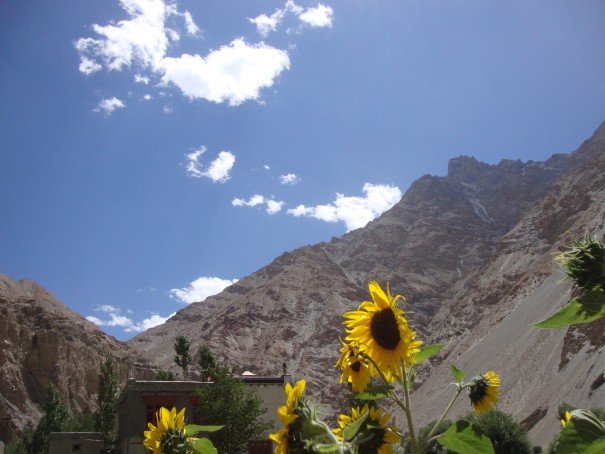
Barley Wine in the Abode of Snow

Barley Wine in the Abode of Snow
Chang in Ladakh
Chang is a kind of barley wine that is well loved in Ladakh, the region of the Indian Himalayas I was visiting, where the high altitude and harsh climate dictate that barley is a staple crop. Ladakhi kitchens are laid out like trophy rooms with metal plates, bowls, and pots arranged in elegant rows, propped up for full visibility. And there is usually a pitcher designated for chang, which comes down from the shelf for celebrations, though I came to understand that even a neighbor’s visit is often deemed reason enough to celebrate.
I had come to Ladakh to go trekking, and while I was there, I wanted to try this favorite Ladakhi drink. But despite its popularity, chang was nowhere to be found in Leh, the region’s largest town. Beer was common enough in restaurants, so this was a bit puzzling. The best explanation I was given for its conspicuous absence was that no one sells chang because everyone makes their own. I asked my guide, Jigmet, if we might be able to hunt down some barley homebrew on a trek, and he promised me we would.
We set out, with my friends Charlie and Brett, to spend a few days walking in the mountains. We left Leh early, and after a brief van ride, found ourselves at the trailhead. We walked. The sun beat down on us with a keen intensity through the thin air and lit up the faded tan and iron-rich red cliff faces. Snow-fed streams twisted down through the valleys, copses of bushy poplars and tall, slender willows along their banks. Each night we found room and board in homestays in the tiny villages along the way, and each day we walked through expanses of rocky moonscape. We could see miles in any direction, and the sky unfolded over us with a hugeness completely foreign to urban environments, which seemed about right, as we were a couple miles closer to it than usual.
In 2009, Ladakh was the setting for the wildly popular Bollywood film 3 Idiots, and since then the region has seen a drastic increase in tourism. But as well known and highly-trafficked as the region has become, it’s still not difficult to find areas of Ladakh that are almost completely remote from the rest of the world. On a previous trek, I had stopped for tea at the home of a woman who had beckoned to my party as we walked by. When we were leaving her house, we tried to offer her some rupees in return for her kindness. Her mystified reaction suggested not that we’d offended her sense of hospitality, but rather that she didn’t recognize the currency of her own nation.
On this visit, we arrived at our final homestay in the village of Shingo and I had pretty much given up on finding some chang. It was no great loss though. Brett had fallen sick earlier in the week, and I knew that Jigmet had been preoccupied with making sure the trek wasn’t too taxing for him. I decided not to bring it up, and went to bathe in a nearby stream. But later that afternoon when I was back in the house reading, Jigmet strode into the room and glanced about knowingly. “Hey guys, want to have some chang?” he asked.
We did. We gathered around the table and he brought over a gold-colored pitcher. He instructed us to mix in tsampa, a roasted barley flour often used to make porridge. The chang was a bathwater greyish brown, and I braced myself for something grim.
But the drink was surprisingly pleasant and mellow. The chang itself was slightly sweet and acidic, and the tsampa gave it a full-bodied thickness, cutting its faintly acerbic bite with warm, nutty undertones. We passed the pitcher around, relieved. The name ‘Himalaya’ comes from Sanskrit meaning “abode of snow,” and the mountains certainly earn their title. But this was a drink to soften the winter’s sting; a restorative to be quaffed with neatly folded momos and hot vegetable stews. A fine drink to mark the end of our trek.
Later, I went outside to wash my face. Jigmet had walked to the nearest phone to call the trekking company, and now he came winding back through barley fields around the house. As he approached, I motioned across the valley to the mountains that shot up from beyond the river, glowing auburn in the sunset. In a few hours, a full moon would rise and the entire valley would be awash in silver. It was mid-August, and Jigmet had already been in the field for over ninety days this season. “Does this ever get boring to you?” I asked. “Not really,” he laughed, and headed back inside.